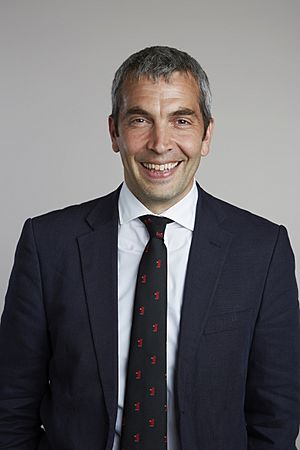Ben G. Davis facts for kids
Quick facts for kids
Ben Davis
FRS FMedSci
|
|
|---|---|

Ben Davis at the Royal Society admissions day in London, July 2015
|
|
| Born |
Benjamin Guy Davis
8 August 1970 |
| Other names | Benjamin |
| Education | Nottingham High School |
| Alma mater | University of Oxford (BA, DPhil) |
| Awards |
|
| Scientific career | |
| Fields |
|
| Institutions |
|
| Thesis | Synthesis of inhibitors of sugar processing enzymes (1996) |
| Doctoral advisor | George Fleet |
| Other academic advisors | J. Bryan Jones |
Benjamin Guy Davis FRS FMedSci (born 8 August 1970) is Professor of Chemical biology in the Department of Pharmacology and a member of the Faculty (by courtesy) in the Department of Chemistry at the University of Oxford and a Fellow of Pembroke College, Oxford. He holds the role of Science Director for Next Generation Chemistry (2019-2024) and Deputy Director (2020-) at the Rosalind Franklin Institute.
Education
Davis was privately educated at Nottingham High School followed by the University of Oxford where he was awarded Bachelor of Arts degree in Chemistry (with Chemical Pharmacology) in 1993 and a Doctor of Philosophy in 1996 supervised by George Fleet. He was a student of Keble College, Oxford.
Research and career
After his PhD, Davis spent two years as a postdoctoral research fellow in the laboratory of J. Bryan Jones at the University of Toronto, exploring protein chemistry and biocatalysis. There he developed, with Jones and Genencor International Inc., early examples of targeted protein degradation systems. In 1998 he returned to the United Kingdom to take up a lectureship at Durham University. In the autumn of 2001 he moved to the Dyson Perrins Laboratory in the Department of Chemistry and received a fellowship at Pembroke College, Oxford. He was promoted to Professor of Chemistry in 2005. In 2021 in a new partnership between the Rosalind Franklin Institute and the University of Oxford he took up a joint position between Medical Sciences in the Department of Pharmacology and the role of Science Director for Next Generation Chemistry; this post lasts until 2024. From November 2023 to April 2024 he was the Interim Director of the Institute.
His group's research centres on the chemical understanding and exploitation of biomolecular function (Synthetic Biology, Chemical Biology and Chemical Medicine), with an emphasis on carbohydrates and proteins. In particular, the group's interests encompass synthesis and methodology; target biomolecule synthesis; inhibitor/probe/substrate design; biocatalysis; enzyme and biomolecule mechanism; biosynthetic pathway determination; protein engineering; drug delivery; molecular biology; structural biology; cell biology; glycobiology; molecular imaging and in vivo biology.
Research in the Davis laboratory has been funded by the Engineering and Physical Sciences Research Council, the Biotechnology and Biological Sciences Research Council, the Medical Research Council, UCB-Celltech, AstraZeneca, the European Union, GlaxoSmithKline, Cancer Research UK, the Wellcome Trust and the Royal Society. He has supervised numerous postdoctoral researchers and doctoral students to completion.
Awards and honours
Davis was elected a Fellow of the Royal Society in 2015. His certificate of election reads:
Professor Davis is noted for his chemical interrogation and manipulation of biological systems, particularly those that hinge on carbohydrates and proteins. He has developed selective and benign bond forming strategies that have been applied to biology, allowing the construction of synthetic biomolecules and bioconjugates; the creation of synthetic cells and viruses; and in vivo chemistry. These have enabled associated mechanistic details of protein and sugar biology to be elucidated and exploited for biotechnological applications.
In 2017, he was elected a Member of the Academia Europea and in 2019, he was elected a Fellow of the Academy of Medical Sciences.
He was also a recipient of the Mullard Award from the Royal Society in 2005, the Philip Leverhulme Prize in 2002 and the Meldola Medal and Prize in 1999 from the Royal Society of Chemistry. He won the Whistler Award of the International Carbohydrate Organization in 2016. He also received the Davy Medal ("awarded for outstanding contributions in the field of chemistry") from the Royal Society in 2020.

